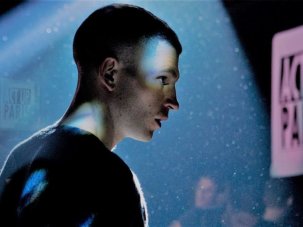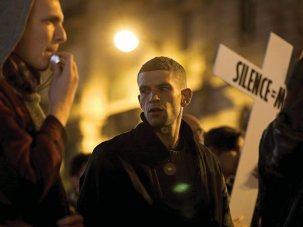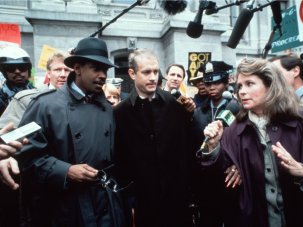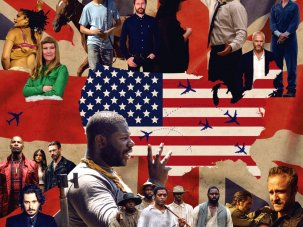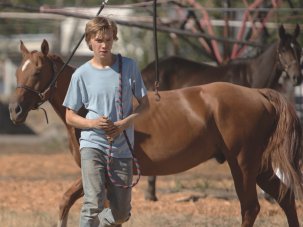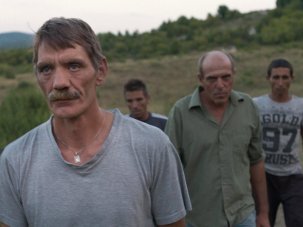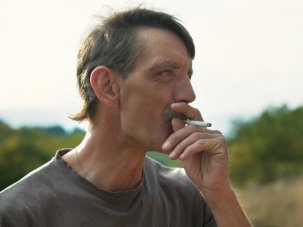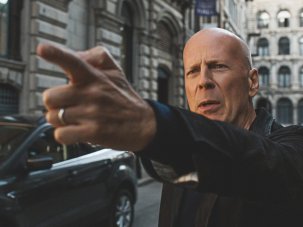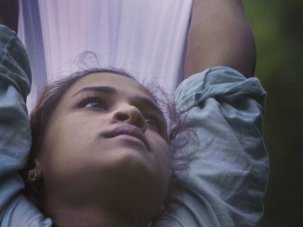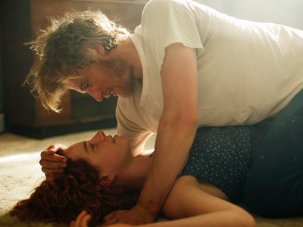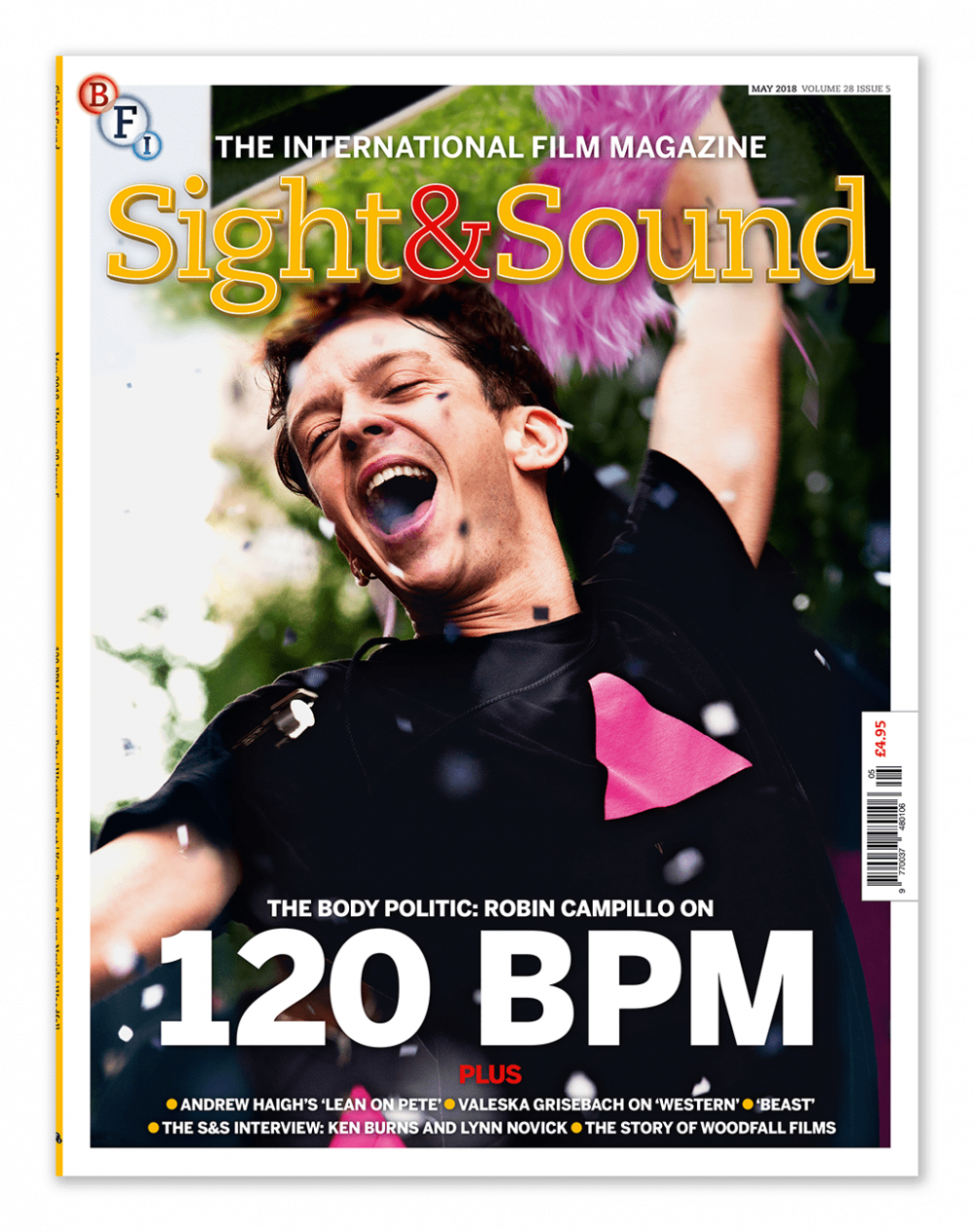
How to survive a plague? The title of David France’s documentary account of the the HIV/Aids crisis that tore through the queer community in the 1980s and early 90s United States, and the direct-action activism and self-organising that ensued in the face of official indifference, equally applies to 120 Beats Per Minute, Robin Campillo’s fictionalised retelling of the comparable life and death dramas played out in France at the same time. Tracking a dozen-odd members of Parisian Act Up through a series of spectacular political interventions and planning meetings, as well as charged scenes of dance, sex, illness and death, the film, writes Ben Walters in his review, “is a collective story about collective action, willing to sit with dissensus, ambiguity and irresolution, and all the more enthralling and devastating for it. As a period piece, it’s revelatory. As a call to arms, it’s galvanising.”
Posted to subscribers and available digitally 3 April
→ Buy a print edition
→ Access the digital edition
→
On UK newsstands 5 April
In our cover interview, Roger Clarke talks to Campillo about his memories of the movement’s energy and iconography (“We were creating images – we were directing ourselves”) as well as its heightened, confusing passions, how he combined unwanted experience with the mise en scene of William Wyler’s The Little Foxes to film death, and the influence of Jimmy Someville on the sound editing. Overleaf, Simon McCallum retraces the story of cinema’s own opening up to the realities of “one of the worst pandemics in history”, from early distress calls like Arthur J. Bressan’s Buddies (1985) and Bill Sherwood’s Parting Glances (1986) to more celebrated latter-day fiction and nonfiction movies from north America, Britain and France to Israel.
“Is it possible that contemporary British stories are somehow too small for the big screen? Are there inherent limits to our cinematic imagination? Is it really up to domestic television to do the difficult work of national self-scrutiny?” asks Will Massa in his feature Atlantic Drift, pointing out a new pattern of leading lights of British independent filmmaking lately applying their talents to distinctly American stories and genres – he counts a dozen features made in the last five years, from You Were Never Really Here to Three Billboards Outside Ebbing, Missouri, Baby Driver, Free Fire, Hell or High Water, American Honey, 12 Years a Slave and Andrew Haigh’s new Lean on Pete, with more to come from Steve McQueen, Yann Demange, Carol Morley and Chris Morris.
“There are now several generations of film lovers (and filmmakers) who are likely to be more familiar with the topography and iconography of the United States than they are with those of their own country,” Massa worries, “or for whom the onscreen experience of class or black and Asian representation, for example, is filtered through an American prism rather than the distinct configurations playing out within their own borders. Cinema can take us there, but all too often it is taking us there.” Thankfully there are hopeful counterexamples – but if there was ever a moment for our best artists to be helping us plumb the British psyche, it’s surely now.
“It’s amazing how you can get pigeonholed and labelled by the critical community,” says Haigh in turn. “When Weekend came out, it was: “Oh, he’s the gay filmmaker”; then 45 Years came out, and there was this understanding that I was going to tell British stories about British situations. That has never been my intention. I care about character above all. Lean on Pete may seem like a very different film, but how I feel about Charley is how I felt about Kate in 45 Years or about Russell in Weekend. They are all struggling with similar things, with loneliness, with trying to understand how they can find some kind of meaning or purpose in their life, in order to make themselves happy.” Haigh talks to Michael Leader about filming loneliness in his adaption of Willy Vlautin’s portrait of an unsheltered boy and a worn horse’s reversal of the Oregon trail in search of security and safety – and about building confidence, trusting in the lived-in quality of veteran actors, and the importance of endings.
“There’s something about returning to the place that you’re from; whether that be a literal biographical film, or just the landscape and the atmosphere,” Michael Pearce tells Nikki Baughan. His bold, visceral thriller debut Beast is shot in his childhood landscape of Jersey, and complements the recent British ‘farm trilogy’ of The Levelling, God’s Own Country and Dark River in its raw, defined sense of (non-cosmopolitan) place, reimagining a folkloric Jersey trauma from the 1960s – the ravages of the Beast of Jersey – as a properly primal fairytale of a woman in the wild woods of an ambiguous romance. “It had to feel like it could have been shot on the Serengeti, with wild animals,” says Pearce. He and producer Ivana Mackinnon talk about redefining ‘strong’ female characters, avoiding psychosexual and procedural clichés, and finding fortune in natural and financial afflictions.
“Ealing, Gainsborough, Hammer, Powell and Pressburger’s The Archers: all of these British film companies deserve their place in cinema history. But in terms of national and international impact, Woodfall Films – subject of the forthcoming 17-film BFI retrospective and accompanying eight-film Blu-ray box-set – is no less deserving of a position in the pantheon,” writes Neil Young, introducing his history of the under-celebrated company formed to bring John Osborne’s Look Back in Anger to the screen, which went on to bolster not only first-time director Tony Richardson’s subsequent career but to define the new wave of British ‘kitchen sink’ classics – Saturday Night and Sunday Morning, A Taste of Honey, The Loneliness of the Long Distance Runner.
The company made a grand total of 21 titles – spanning further hits (Tom Jones, The Knack… and How to Get It, Kes, O Lucky Man!), misses (The Sailor from Gibraltar, Ned Kelly), films wrongly maligned or neglected (Mademoiselle, Laughter in the Dark) and the plain eccentric (The Hotel New Hampshire). As director Karel Reisz remembered, “They were all made by writers who had never written, directors who had never directed, and actors who had never acted, and so on, all the way down the line” – and as Young adds, actors “from the far-flung corners of the British Isles and the lower rungs of the socio-economic ladder,” fitting them to a story template “of an upstart lower-class outsider seeking to find his way in a rigidly class-bound society”.
“It’s the easiest thing in the world to claim that a film set in the present day, in America or elsewhere, is ‘really’ a western: usually all that’s needed is a stretch of landscape, and a weather-beaten male face or two, and the comparison can be made to stand well enough,” begins Jonathan Romney. “But Western – the long-awaited third film from German director Valeska Grisebach – fits its title in so many ways that it comes across as virtually an arch-western, despite being set in Eastern Europe.” Eleven years after her last film, Grisebach unfolds her identification with (and attraction to) loner masculinity, the politics of Westerners in Eastern Europe and her insistence on withholding her film scripts from her carefully gleaned non-professional actors.
“Unlike most of their documentary contemporaries, the challenge for considering the work of Ken Burns and his frequent producing and directing partner Lynn Novick isn’t simply to get people to watch” – people know about Ken Burns – “it’s to get people to realise the complexity and artistry of what they’re watching,” writes Eric Hynes. “Take another look at that big book on the shelf – you might find it odder and more provocative than you recall.” In a generous, hour-long conversation the two collaborators discuss “the work that time does” in the context of their latest history epic The Vietnam War, what makes someone interview-worthy, their pursuit of higher common denominators for an art that disarms and reconciles – and the question, now, of whether the American experiment is on the rocks.
Also in this issue: Custody director Xavier Legrand, Dennis Cooper, non-professional actors, Mark Cousins on men and musicals, the success of The Square, the ending of Lindsay Anderson’s If…. and yet more.
Features
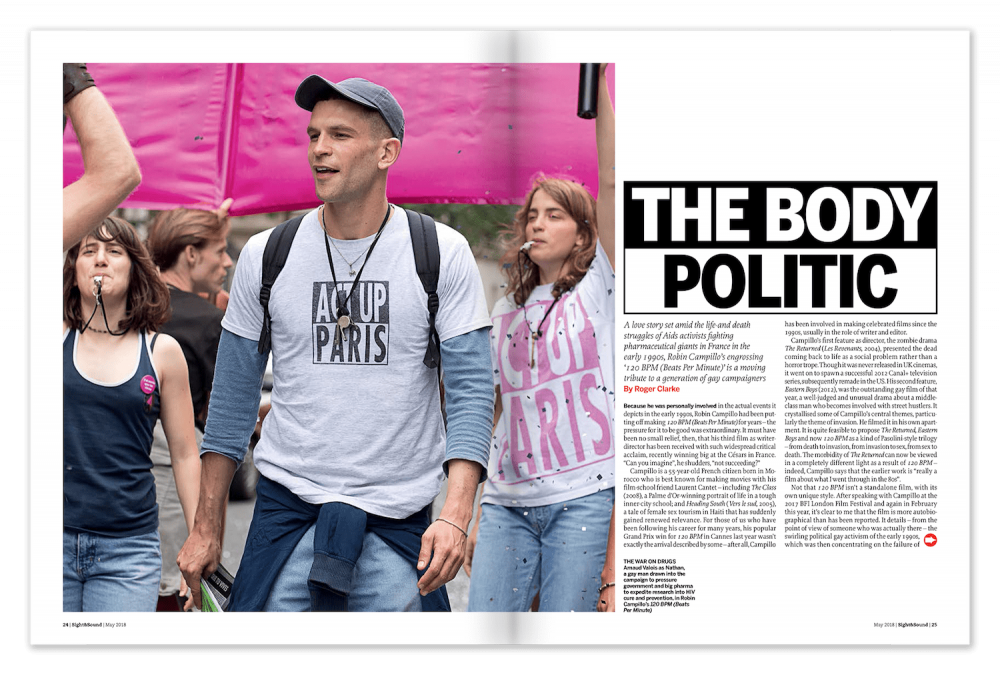
The Body Politic
A love story set amid the life-and-death struggles of Aids activists fighting pharmaceutical giants in France in the early 1990s, Robin Campillo’s engrossing 120 BPM (Beats Per Minute) is a moving tribute to a generation of gay campaigners. By Roger Clarke.
+ How to dramatise a plague: a brief history of Aids on screen
The realities of Aids were ignored by mainstream culture in the early years of the virus, but little by little, film and TV have learned to be honest about life and death in the HIV age. By Simon McCallum.
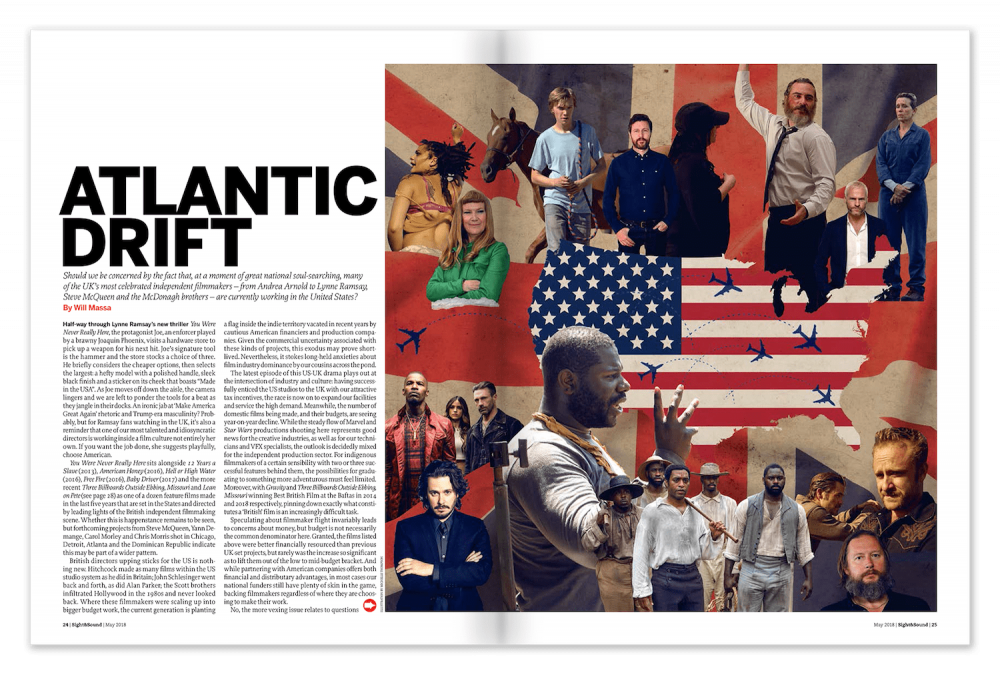
Atlantic Drift
Should we be concerned by the fact that, at a moment of great national soul-searching, many of the UK’s most celebrated independent filmmakers – from Andrea Arnold to Lynne Ramsay, Steve McQueen and the McDonagh brothers – are currently working in the United States? By Will Massa.
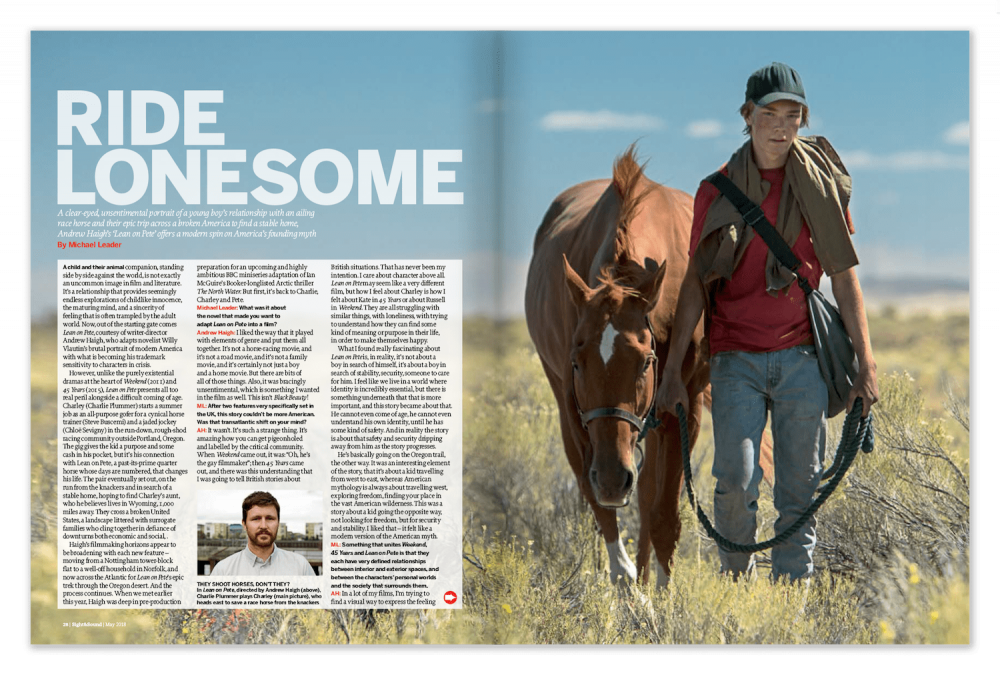
Ride Lonesome
A clear-eyed, unsentimental portrait of a young boy’s relationship with an ailing race horse and their epic trip across a broken America to find a stable home, Andrew Haigh’s Lean on Pete offers a modern spin on America’s founding myth. By Michael Leader.
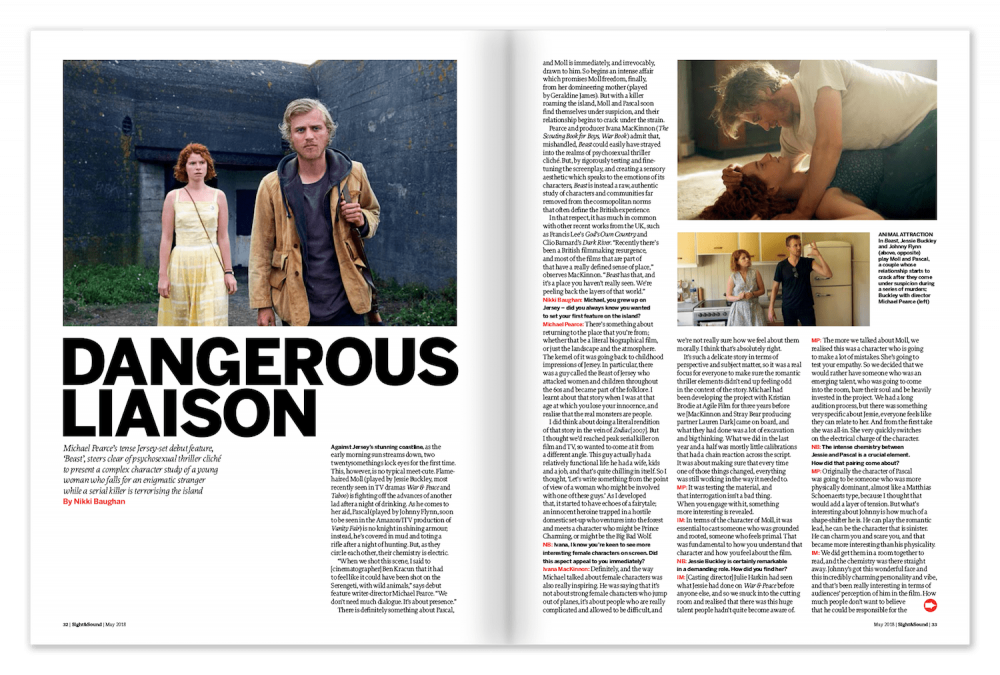
Dangerous Liaison
Michael Pearce’s tense Jersey-set debut feature, Beast, steers clear of psychosexual thriller cliché to present a complex character study of a young woman who falls for an enigmatic stranger while a serial killer is terrorising the island. By Nikki Baughan.
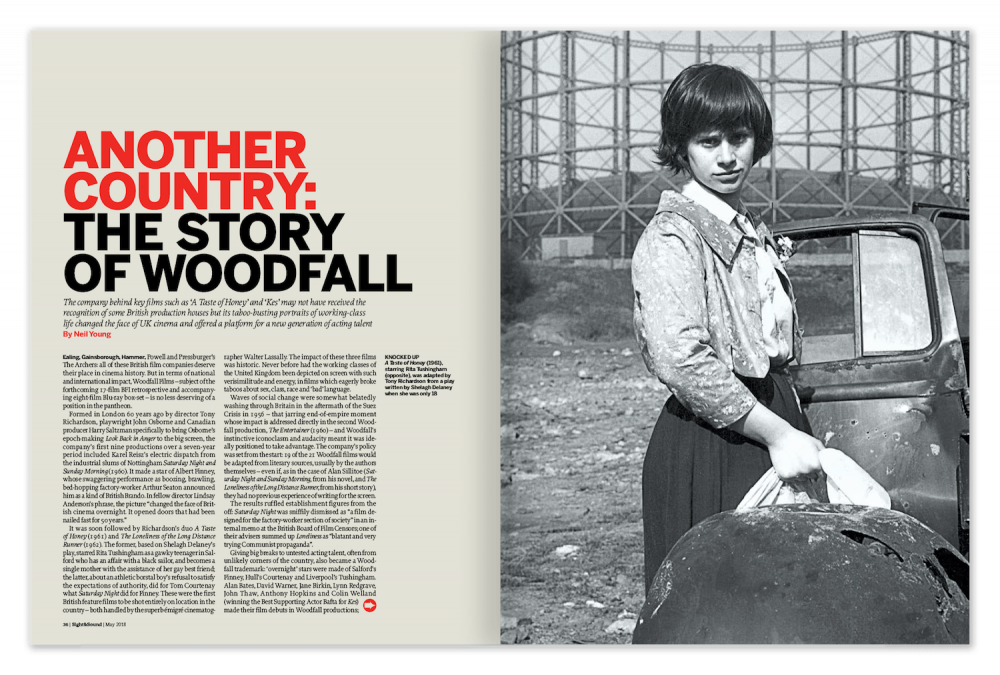
Another Country: The Story of Woodfall
The company behind key films such as A Taste of Honey and Kes may not have received the recognition of some British production houses but its taboo-busting portraits of working-class life changed the face of UK cinema and offered a platform for a new generation of acting talent. By Neil Young.
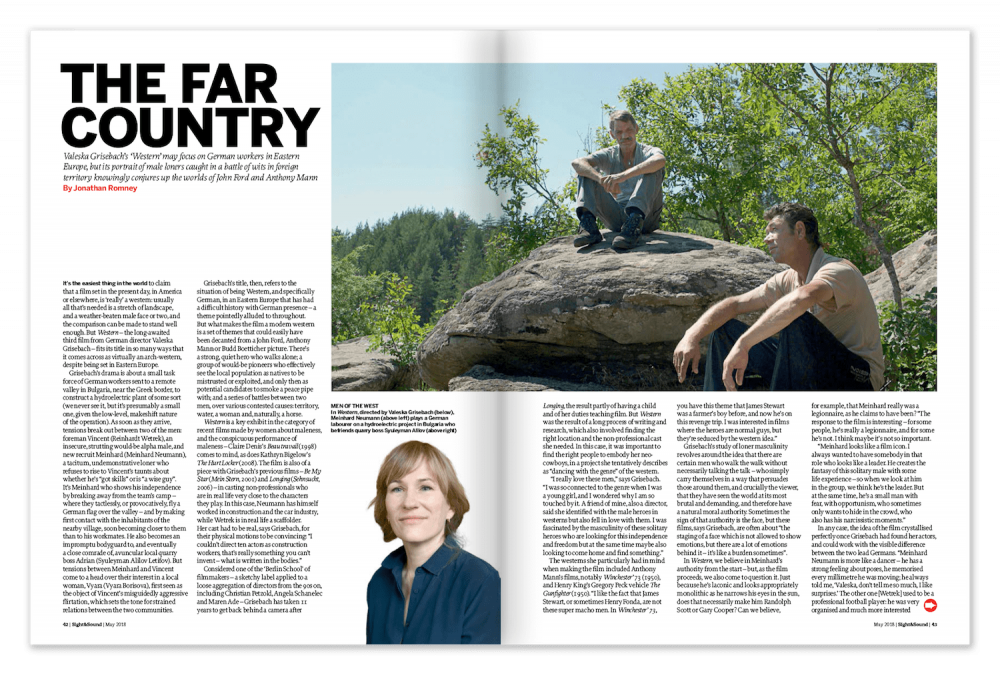
The Far Country
Valeska Grisebach’s Western may focus on German workers in Eastern Europe, but its portrait of male loners caught in a battle of wits in foreign territory knowingly conjures up the worlds of John Ford and Anthony Mann. By Jonathan Romney.
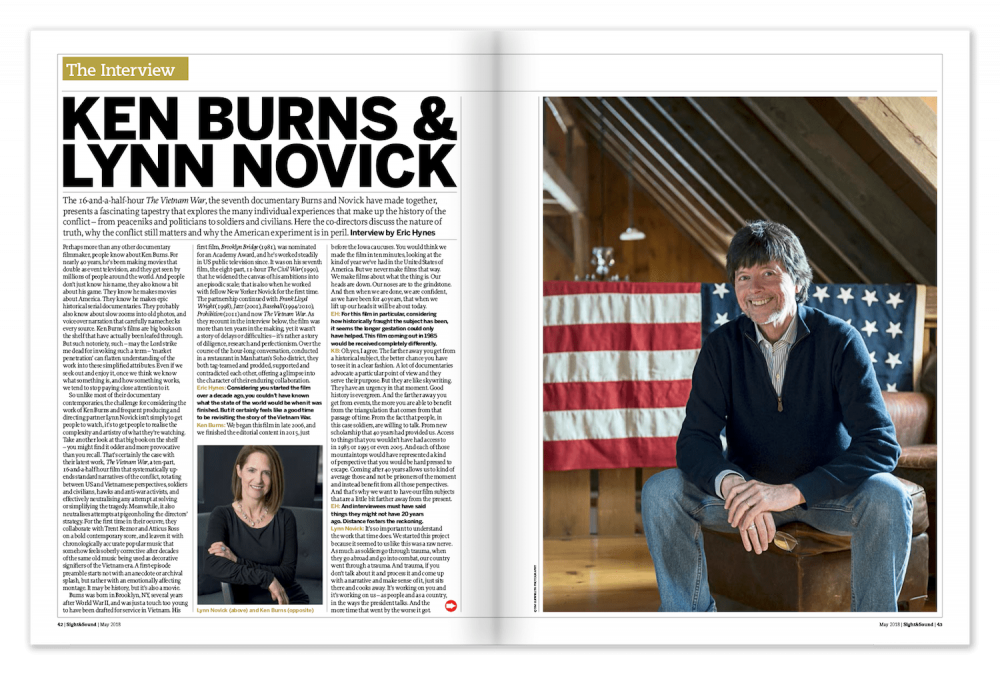
The S&S Interview: Ken Burns and Lynn Novick
The 16-and-a-half-hour The Vietnam War, the seventh documentary Ken Burns and Lynn Novick have made together, presents a fascinating tapestry that explores the many individual experiences that make up the history of the conflict – from peaceniks and politicians to soldiers and civilians. Here the co-directors discuss the nature of truth, why the conflict still matters and why the American experiment is in peril. Interview by Eric Hynes.
Regulars
Editorial
Calling the shots
Rushes
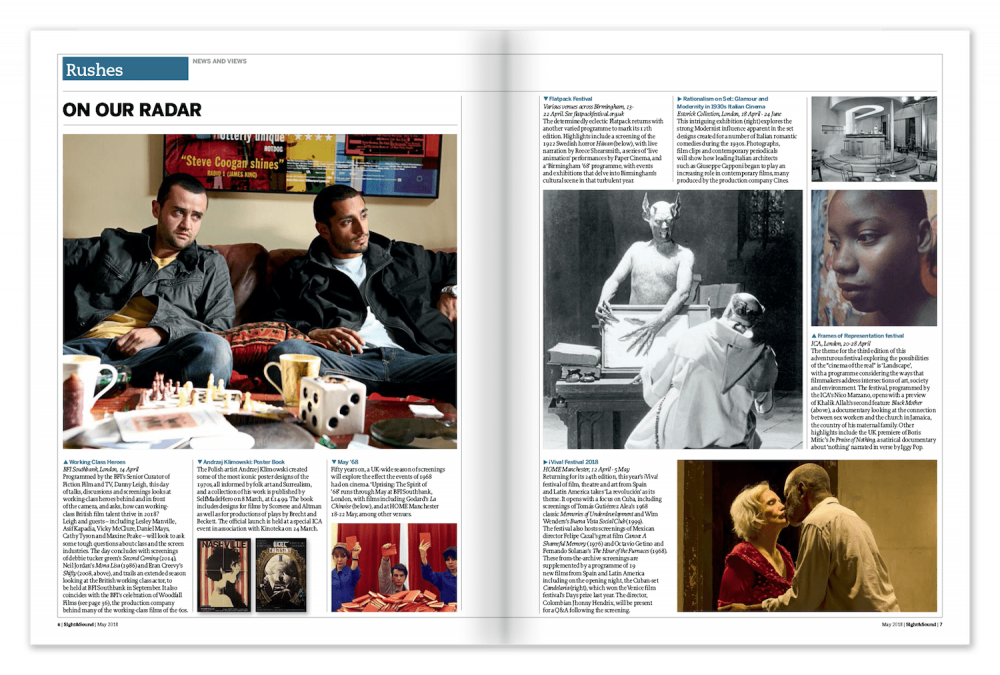
Our Rushes section
On our radar
May ‘68, Working Class Heroes, Andrzej Klimowski: Poster Book, Flatpack Festival, Rationalism on Set: Glamour and Modernity in 1930s Italian Cinema, Viva Festival 2018, and Frames of Representation Festival.
Interview: Fear eats the soul
Xavier Legrand’s superb feature debut Custody is both a stab at France’s patriarchal attitudes and a genuinely menacing horror film. By Kieron Corless.
The numbers: The Square
Charles Gant reckons up the Cannes effect and the success of The Square.
Dispatches: Song and dance men
Could the tepid critical response to the brilliant The Greatest Showman have anything to do with a general male suspicion of musicals? By Mark Cousins.
Wide Angle
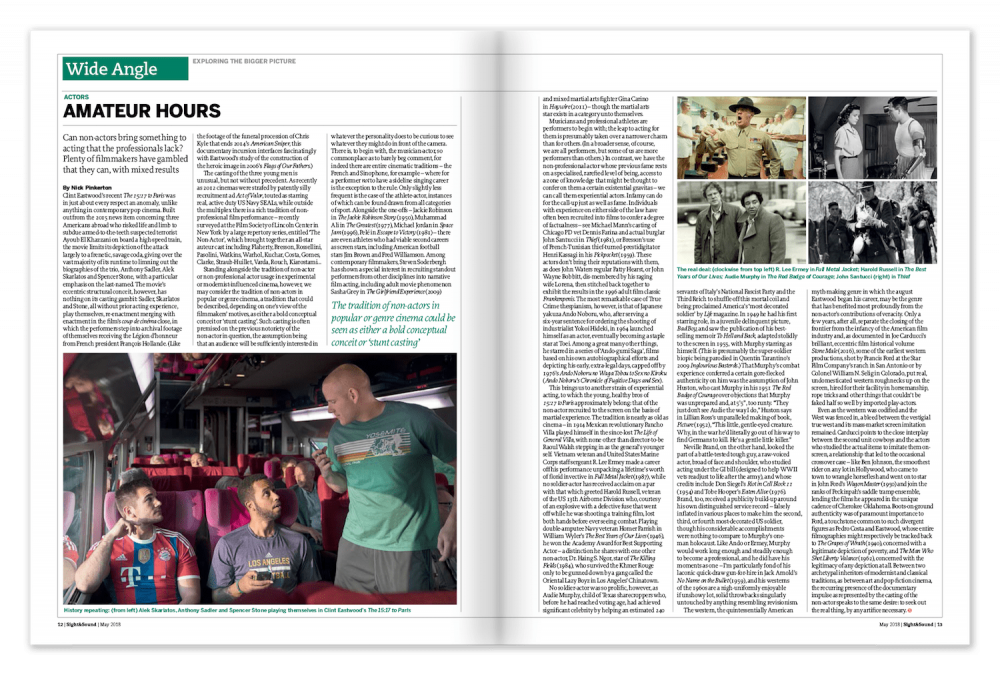
Our Wide Angle section
Forum: Amateur hours
Can non-actors bring something to acting that the professionals lack? Plenty of filmmakers have gambled that they can, with mixed results. By Nick Pinkerton.
Primal screen: Dark foreboding
An Austrian satirical film from the 1920s, freshly restored, has recovered all its old urgency and topicality? By Pamela Hutchinson.
Profile: Teenage kinks
Dennis Cooper’s films, preoccupied with the nihilism of adolescent boys, can be hard to watch – and are more and more worth watching. By Tony Rayns.
Reviews
Films of the month
A Gentle Creature
Let the Sunshine In
Wonderstruck
plus reviews of
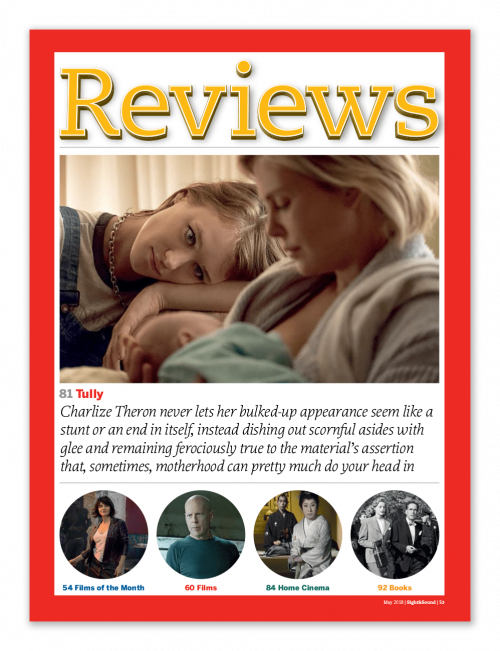
Our Reviews section
Annihilation
Beast
Big Fish & Begonia
Cake
Crowhurst
Custody
Dark Beacon
Death Wish
Detective Chinatown 2
Even When I Fall
Every Day
Funny Cow
Game Night
Ghost Stories
Gringo
The Guernsey Literary and Potato Peel Pie Society
I Kill Giants
Love, Simon
Marlina the Murderer in Four Acts
Midnight Sun
Mute
Never Steady, Never Still
120 BPM (Beats Per Minute)
Thoroughbreds
The Titan
Tomb Raider
Tully
Walk like a Panther
Western
The Wound
A Wrinkle in Time
Home Cinema features
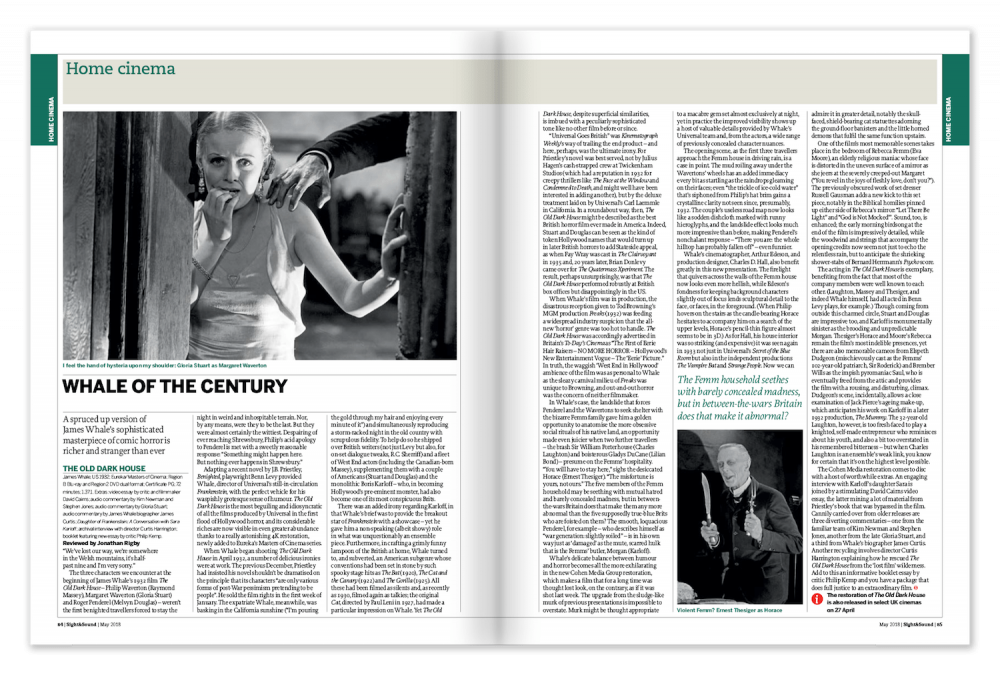
Our Home Cinema section
Whale of the century: The Old Dark House
A spruced up version of James Whale’s sophisticated masterpiece of comic horror is richer and stranger than ever. By Jonathan Rigby.
Lost and found: American Hot Wax
Floyd Mutrux’s biopic of Alan Freed killed his directing career, but underlined an important truth: rock ’n’ roll will never die. Reviewed by Andrew Male.
plus reviews of
An Actor’s Revenge
The Age of Innocence
The Barefoot Contessa
Breathless
Charley Varrick
Two films by Christian-Jaque: Les Disparus de St. Agil / L’Assassinat du Père Noël
Sacha Guitry: Four Films 1936-1938
Images
Penitentiary / Penitentiary II
Ramrod
Ship of Fools
Silence and Cry
Television
Threads. Reviewed by Robert Hanks.
Books
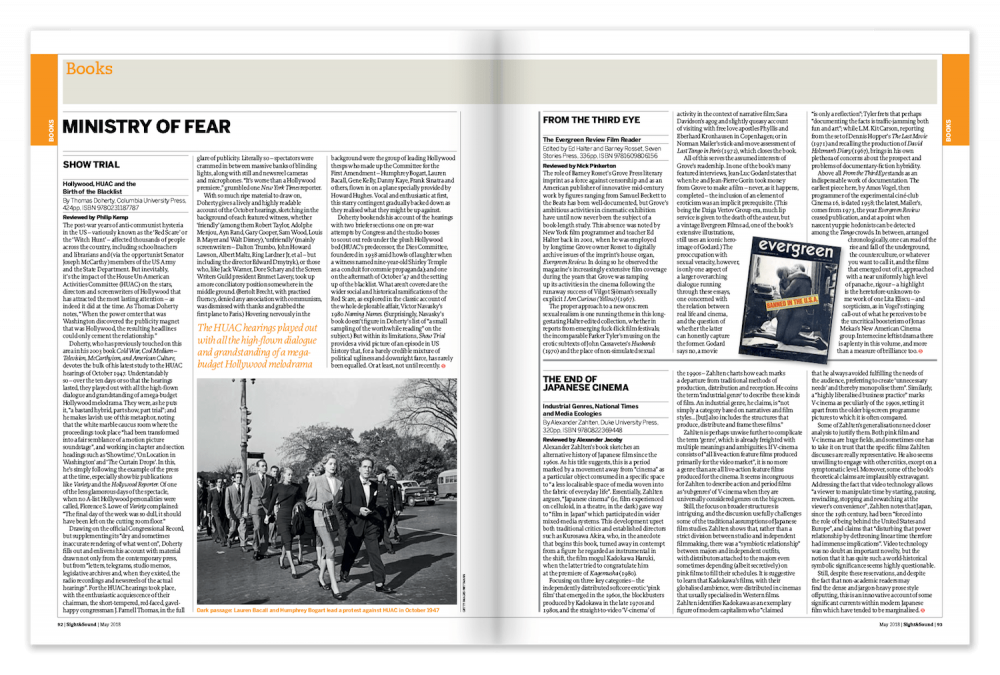
Show Trial: Hollywood, HUAC and the Birth of the Blacklist by Thomas Doherty (Columbia University Press) reviewed by Philip Kemp
From the Third Eye: The Evergreeen Review Film Reader Edited by Ed Halter and Barney Rosset (Seven Stories Press) reviewed by Nick Pinkerton
The End of Japanese Cinema: Industrial Genres, National Times and Media Ecologies by Alexander Zahlten (Duke University Press) reviewed by Alexander Jacoby
Letters
The vandalism of colourisation
4K or not 4K?
Independent cinema is thriving outside London
Endings
If.…
The bloody public school uprising that closes Lindsay Anderson’s If…. is a peculiarly British contribution to the heady radicalism of 1968. By Lou Thomas.
Further reading
-
The Digital Edition and Archive quick link
Log in here to your digital edition and archive subscription, take a look at the packages on offer and buy a subscription.




